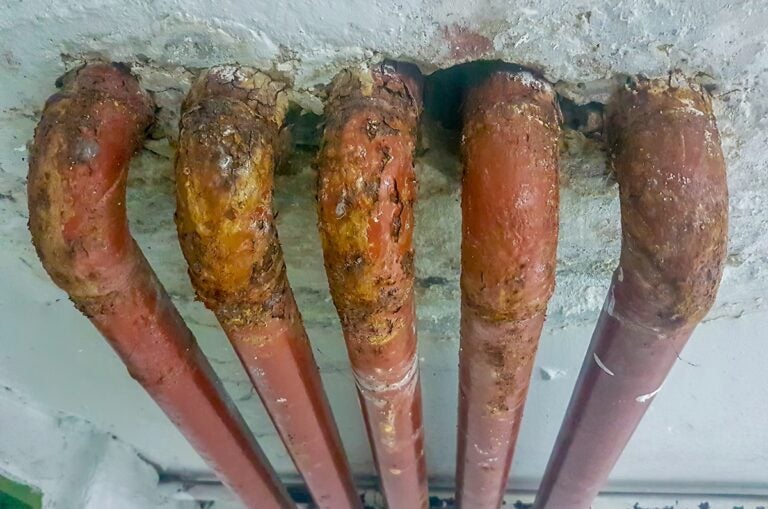‘Kicking the can’: Advocates say Delaware isn’t doing enough to prevent childhood lead poisoning in schools
Advocates say the state lacks transparency on school drinking water quality and attempts to remove lead contamination.
Listen 0:56
Advocates are saying that Delaware has not done enough to address the high levels of lead found in schools. (Jose Angel Astor Rocha/iStock)
What are journalists missing from the state of Delaware? What would you most like WHYY News to cover? Let us know.
Lead poisoning is dangerous, and advocates say too many kids in Delaware have elevated levels of lead in their bodies.
Advocates for children’s health faulted the state for its response in addressing alarmingly high lead levels in schools, and also in housing, during a panel discussion Wednesday night at the Wilmington Public Library. Hosted by the Newark branch of the NAACP, participants included representatives from the state’s largest teacher’s union, the City of Wilmington, the Christina School District and community advocates.
“There is no safe level of lead in your blood without cognitive or health impacts. So this is a very serious issue,” said Amy Roe of Lead-Free Delaware.
Some who attended the panel event said they were frustrated by the state’s lack of urgency in addressing the problem.
Elevated levels of lead in a child’s blood can lead to cognitive and behavioral delays, lower intelligence scores and an increased risk of criminal behavior. Kids are required to be tested at 12 months and again at 24 months of age.
“This has been going on forever in Delaware, and they’re not trying to do anything about it,” said Newark NAACP Vice President Richard Williams. “They just keep kicking the can down the road.”
The national standard for an elevated blood lead level test result is now greater than or equal to 3.5 micrograms per deciliter. Delaware’s lead threshold for shutting off water fountains and spigots is 7.5 parts per billion. The threshold was previously 15 parts per billion prior to the Environmental Protection Agencies directive to change it.
Roe said her organization wants lead safe water in every school, but said the state of Delaware has not given her assurances on that front.
Statewide school lead abatement efforts
The last time the state tested water quality levels in schools was in 2023. That was after flawed testing in 2020, as samples were incorrectly collected by inexperienced school personnel. The state delayed releasing the results, causing fierce public backlash. Then it was discovered that elevated lead levels in school drinking water were widespread and at dangerous levels.
In June 2023, a WHYY News analysis of the 1,600 samples revealed that lead was detected at more than 7.5 parts per billion at a total of 149 sites in 49 schools. But there’s no money to continue statewide testing. A spokesperson for the Delaware Department of Education said the previous testing was funded through a federal grant.
A November 2023 report by the Delaware Division of Public Health found 694 children between the ages of 0 and 6 years old with elevated levels of lead in their blood, which amounts to 5.9% of those tested with a lead amount of greater than or equal to 3.5 micrograms per deciliter. The report did not include results from kids older than 6 years old.
“Lead poisoning is a preventable occurrence but continues to be a significant environmental hazard for children in Delaware,” the report stated. “Young children up to age 6, whose brains develop rapidly, are at greatest risk of harm from lead exposure.”
The Division of Public Health is required to provide annual reports on elevated blood lead levels, under legislation signed into law in 2021 by then-Gov. John Carney, but no reports after 2023 are listed on the agency’s website.
WHYY News reached out to public health officials for comment, but did not hear back by publication.
State lawmakers directed $3.8 million in 2023 to a “Filter First Initiative” for school districts to install filters to remove lead from school drinking water. Delaware Department of Education spokesperson Alison May said the money was provided directly to districts and charter schools for mitigation efforts, including filters, following the 2023 statewide testing program.
Roe said it’s unclear exactly how that money was spent because DOE has not detailed publicly the number of filters installed.
Testing shifts to school districts
Legislation in 2022 transferred testing of school drinking water to school districts, who are required to submit an annual report of their findings and maintenance plan to DOE, the Controller General, the Office of Management and Budget and members of the General Assembly.
Jeff Taschner, executive director of the Delaware State Education Association, said Wednesday night the legislation requiring school districts to maintain a safe standard of water quality is just a first step.
“We’re hoping that, finally, by establishing a process and making it be reported, that we’re going to start getting to the place we need to so that the buildings we put our children in to learn, our staff into work and in our communities use are safe,” he said.
Christina School District Supervisor of Facilities George Wicks said they submit the information required under the law to DOE and others, but have gotten little in response.
“We gathered a large amount of information in compliance with that that I didn’t feel was reviewed really at all by the people we turned it into,” he said.
Wicks said the district needs money to tackle its deferred maintenance. “We really need facilities funding in education,” he said. “It’s not like they don’t know the need. That’s not the issue. It’s just we need somebody to come alongside us and support us in that.”
When asked what they do with the information, DOE spokesperson May said they collect the reports and make them publicly available.
Progress on lead paint
The panel also discussed the need for lead abatement in housing. According to the U.S. Census, approximately 42% of dwellings in Delaware were built before 1979. According to the 2023 public health report, lead poisoning is a more prevalent problem facing low-income families living in older, unmaintained dwellings. Many of these dwellings are rental properties.
Legislation signed into law earlier this year requires Delaware landlords to prove their rental properties are safe from lead paint within the next three years. It got intense pushback from landlords who said it would be too expensive for them to have to remove any lead found.
Tenants’ rights advocate Donald Farrell said renters can check for lead in their homes using an over-the-counter kit instead of relying on their landlords. He also rang the praises of New Castle County’s No-Lead program for renters, landlords and homeowners. The free program abates lead paint for low- to moderate-income residents living in housing built prior to 1978, where a child under the age of 6 or a pregnant woman visits or lives.
State Sen. Marie Pinkney was the lone state lawmaker on the panel. She said she understood the frustration of members of the public on this issue. She co-sponsored the lead paint bill passed in the Senate in June.
“There’s a conversation to be had about why there’s so much distrust amongst community members and government officials, and it’s a real thing,” she said. “But my point in saying that is that there are actually real lobbying efforts against remediation, particularly when we’re talking about in the homes. So the way that you all are showing up is so important, because we need those same voices lobbying in support of making sure that we’re saving people’s lives.”
This story was supported by a statehouse coverage grant from the Corporation for Public Broadcasting.

Get daily updates from WHYY News!
WHYY is your source for fact-based, in-depth journalism and information. As a nonprofit organization, we rely on financial support from readers like you. Please give today.







